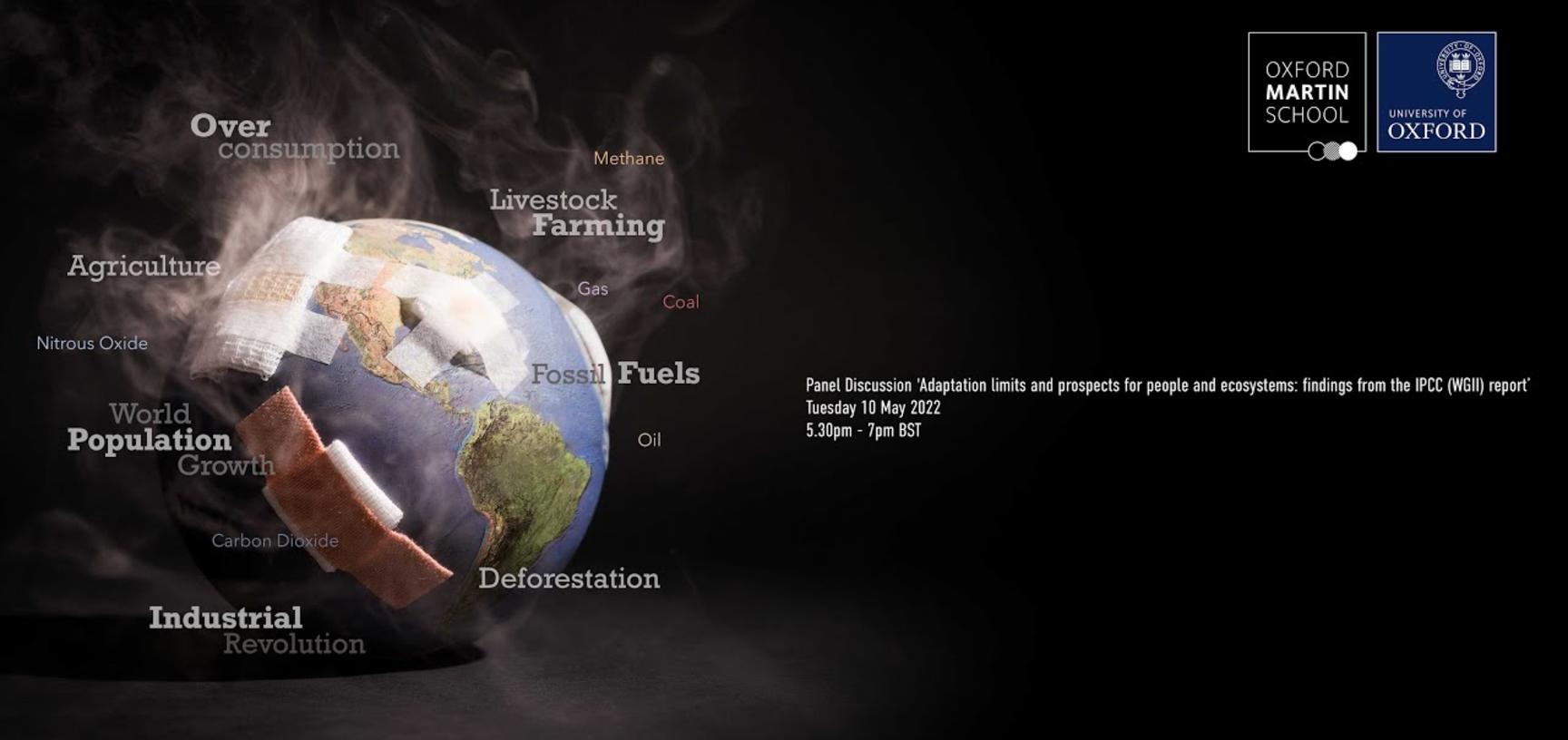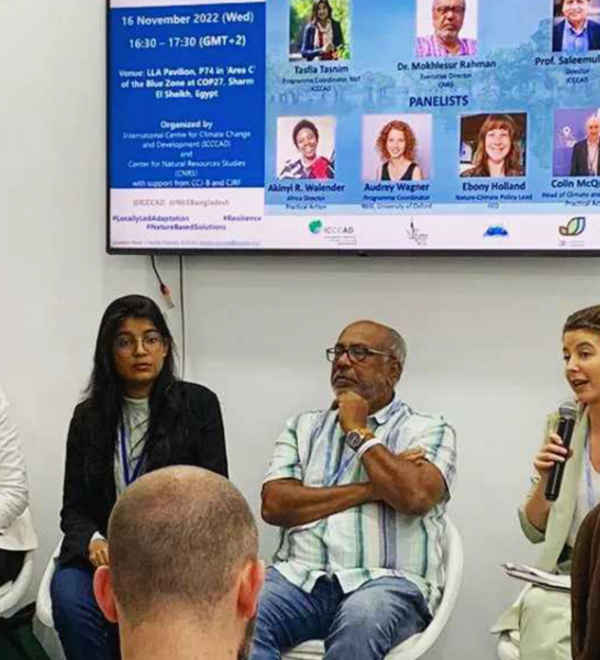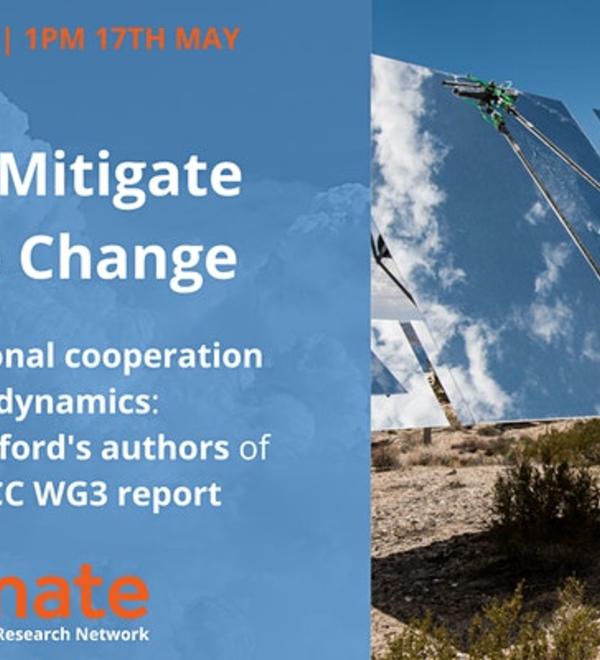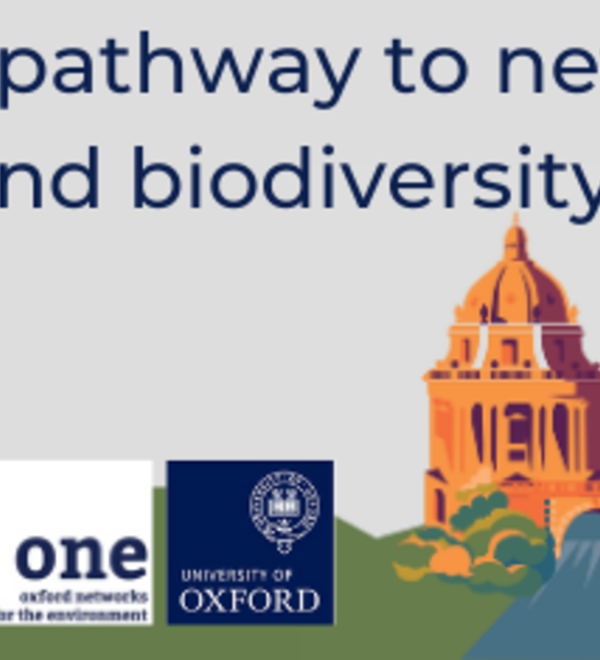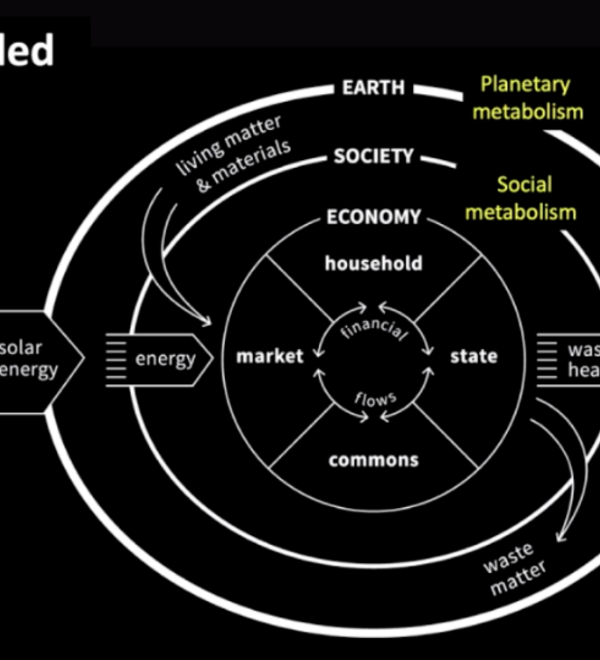Adaptation limits and prospects for people and ecosystems: insights from Oxford's authors of the IPCC AR6 WGII report
Relevant People
Relevant Groups
“There is a need for deliberate transformations” – a panel discussion centred around the IPCC AR6 Working Group II report.
The second event in a series of 3, titled ‘Adaptation limits and prospects for people and ecosystems: findings from the IPCC (WGII) report’, this panel (co-hosted by OCRN and Oxford Martin School) reflected upon the findings of AR6 and explored how it will influence future policy.
As we emerge from the other side of the pandemic (hopefully!), most of us are more aware than ever as to the influence that the natural world can have on human wellbeing, health and development. The Working Group II (WGII) section of the Sixth Assessment Report (AR6) from the Intergovernmental Panel on Climate Change, titled ‘Climate Change 2022: Impacts, Adaptation and Vulnerability’, was released on 28th February 2022 (following the release of the WGI contribution in 2021). The report details the connections between the natural world and humans, the impacts of climate change on biodiversity and consequentially ecosystems, on human health and the occurrence of pandemics, food/nutrition availability and adaptation options and limits.
Involving over 270 authors, 60000 review comments and 34000 citations (IPCC, 2022), the report focusses upon adaptation to climate change. More specifically, it explores the vulnerabilities, capacities and limits of the natural world and of human societies to adapt to climate change.
Many Oxford academics, from numerous departments, contributed to the report (voluntarily as authors are not paid for their time), selected as a result of their expertise. The panel discussion, hosted on 10th May 2022 by OCRN in collaboration with the Oxford Martin School, explored the major findings of the report and their implications for society.
The panel discussed:
- The changing vulnerabilities of communities worldwide to the threats posed by climate change
- How communities and society are adapting to already-demonstrated challenges
- The limitations of ‘adaptation’, whether it will be enough
- Methods of combining mitigation with adaptation, and what this would look like
- The time that we have left and if our window of ‘time for adaptation’ is closing
Panellists:
- Dr Lisa Schipper, Environmental Social Science Research Fellow, ECI. Lisa was Co-ordinating Lead Author of Chapter 18 of the WGII contribution to the IPCC AR6 report - ‘Climate Resilient Development Pathways’
- Dr Nicola Stevens, Trapnell Fellow for African Environments, ECI. Nicola’s research interests centre around the vegetation dynamics of African savannas and how they are likely to change in response to increasing global change pressures such as altered fire and herbivory regimes
- Dr Constance McDermott, Jackson Senior Research Fellow in Land Use and ECI. Constance chairs the ECI's Ecosystems Governance Group and her research addresses the linkages among diverse local, regional and global priorities for sustainable forest management
- Dr Amanda Power, Sullivan Clarendon Associate Professor in History, Faculty of History. Amanda is a historian of religion, power and intellectual life in medieval Europe. She has been involved in developing new approaches to historical study that speak to the concerns of the mounting climate and environmental crisis
- Dr Marco Springmann, Senior Researcher on Environment and Health, ECI (Chair of Panel). Marco is Senior Researcher on Environment and Health at the Environmental Change Institute and an Oxford Martin Fellow on the Oxford Martin Programme on the Future of Food
Dr Lisa Schipper kicked off the event, giving a brief introduction and some background as to the IPCC report and then an overview of who is involved with creating the report. Lisa then delivered the ‘punchline’:
‘The scientific evidence is unequivocal: climate change is a threat to human well-being and the health of the planet. Any further delay in concerted global action will miss the brief, rapidly closing window to secure a liveable and sustainable future for all’.
Lisa highlighted that although over 170 countries have adaptation plans/projects in place, development is a huge obstacle in climate change adaptation – it is and will be much easier for certain countries to adapt than others. Additionally, although there has been action on adaptation, we are just not acting and adapting fast enough. Perhaps surprisingly, Lisa also detailed projects that can cause maladaptation, which usually come about after a lack of consultation with marginalized communities. Lisa’s talk concluded with potential adaptation acceleration mechanisms, which included enhancing knowledge of climate impacts and risks, encouraging inclusive governance and defining clear goals and priorities.
Nicola Stevens then discussed ecosystem adaptation, starting by highlighting the vitality of extensive, biodiverse ecosystems, which we rely on daily (as food sources, for coastal protection and clean air etc.). Nicola detailed how species range-shift changes and alterations in phenology and physiology will begin to have more of an impact globally, and highlighted the 3 climate change extinctions that have happened to date. Nicola reiterated that biodiversity loss is an imminent threat to society.
Nicola proceeded to detail the changes in ecosystems that have occurred as a result of climate change (of which all of these are detailed in AR6). For example, within tundral ecosystems, there has been earlier snowmelt and permafrost thawing and a huge increase in the number of wildfires. Within Mediterranean ecosystems, there have been increased droughts, fire activity, diversity declines, tree mortality and grass dominance. Additionally, temperate forests are showing shifts into deciduous species and high tree mortality as a result of drought, grasslands and savannahs are showing widespread greening, woody encroachment and changing grass productivity. For the most efficient adaptation for ecosystems, Nicola detailed how we should be working towards extended protected areas, with great connection between these. Failing this, assisted migration is the next best option.
Both Lisa and Nicola highlighted similar points:
- Local knowledge is key
- Rushing can lead to maladaptation
- Mitigation and adaptation capacities change with warming
- Natural ecosystems have limits as solutions
- Nature shouldn’t be focussed on as a distraction from the business of cutting emissions
“There has been an absence of the perspectives of social scientist in a crisis that is driven by human behaviour – why? Humanities and social sciences are really important at getting into the grit and the grain of climate change”
Amanda Power followed Nicola, detailing the importance of having anthropological and historical input into the IPCC reports, because climate change is driven by anthropogenic activity. Amanda’s talk was incredibly thought provoking as it explored the progression of development and how it has led to the Anthropocene, which has caused the rapid changes in climate and disaster for biodiversity. Amanda highlighted the “current decay of rational political discourse” and explained why and how we need to pick apart historical societal behaviour and civilisations in order to understand our behaviours today. Amanda wrapped up with a thought that has lingered in my mind for a few days: “why don’t we stop when we know that we’re doing it?”
Constance McDermott followed and further reiterated that we must be careful and pay attention to the relationships of Indigenous communities with their environments. Also highlighted by Constance was the potential of mass movement of finances towards the protection of forests not resulting in win-wins for people and biodiversity, and that the financing of adaptation is an incredibly complex issue. For example, although 17 countries have been reporting REDD+ results, and consequently receiving REDD+ payments, there has been no assessment as to the implementation of the safeguards and adaptation mechanisms.
Following the summary talks given by the panellists, a Q & A was hosted. During this, Lisa highlighted that climate change is not a lone phenomenon and that instead of just tackling climate change, we need a new development paradigm (in response to a question regarding the use of sulphate aerosols to help us cool the earth). In response to another question, Nicola highlighted that there is a global mismatch for potential solutions, and that what works to help us adapt in one region may not help in another, further highlighting the importance of adaptability and engagement with communities. The final question was centred around the psychology and mental health implications of climate change, and Lisa detailed how AR6 is the first report to focus on these.
Refreshments and consequentially eclectic conversations followed the panel discussion, with exchanges of opinion and agreements occurring on masse.
All of the findings from the AR6 report will lay the foundations for many reports to come, and contribute towards the global fight against climate change. The panel highlighted to all just how important engagement with society is, and although adaptation has a huge part to play, we can’t view it as a silver bullet – we must reduce emissions and dedicate more towards mitigating the causes of climate change.
So, what are the next steps? Well, we know that the AR4 & AR5 reports were incredibly accurate and so we can use AR6 to help us predict what the coming years will entail. The next IPCC report will be released around 2030, which will mark the end of the decade of ecosystem restoration and the year by which emissions should have decreased by 50%. This panel showed us that we have time to limit the impacts of climate change but we need to act quickly and collectively.
We thank the panellists who gave insight into the report’s findings for their time. You can find a recording of the talks and Q & A here.
References:
IPCC. (2022). Sixth Assessment Report Fact Sheet. Available: https://www.ipcc.ch/site/assets/uploads/2022/04/AR6_Factsheet_April_2022.... Last accessed 18th May 2022.


